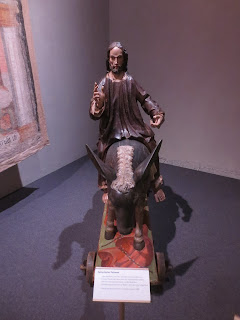In the summer of 2018, my wife Reshmi, my 3 year old son Rehaan, and I visited Switzerland for about 2 weeks. I was keen on visiting Liechtenstein next door, as I was intrigued by this tiny nation, and had heard that it was a beautiful place. So we added it into our itinerary and spent 2 days there. It was a decision we didn't regret at all, because Liechtenstein certainly lived up to what I had heard.
Liechtenstein has a
population of about 37,000 and an area of just 160 sq km, making it one of the
smallest countries in the world. It is a mountainous country sandwiched between
Switzerland and Austria. It has a very high standard of living, and one of the
highest per capita incomes of the world, at over US$ 140,000 per annum. German
is the country’s national language, and the Swiss Franc is the prevailing
currency. The country is divided into 11 municipalities, and Vaduz is the
capital.
Peeping into the nation's history, in the 17th century AD, Karl I was made the Price of Liechtenstein by
the Holy Roman Emperor Matthias. In 1718, Charles VI, the Holy Roman Emperor,
united Vaduz and Schellenberg, and formed the principality of Liechtenstein. From 1815 to 1866,
Liechtenstein was a part of the German Confederation, which was presided over
by the Emperor of Austria. Liechtenstein was closely tied with Austria until
the end of World War I. Subsequently, it had a monetary union with Switzerland. The reigning prince is the
Head of State of Liechtenstein. There
have been 16 monarchs since Karl I’s reign commenced in 1608. The current prince, Hans Adam II, became the monarch
in 1989.
Vaduz, the capital of Liechtenstein, is a town having a
population of around 5,000. It is not the country’s largest town – that would
be Schaan, which has around 6,000 residents. Vaduz is popular with tourists, and
has several interesting sights.
Vaduz Castle is the
official residence of the Prince of Liechtenstein. The castle was originally
built in the 12th century
but underwent many additions and renovations. The Princely Family of
Liechtenstein acquired the castle in 1712. The castle isn’t open to visitors,
but one can walk up and have a look at the castle from outside. The hill where
the castle lies also has a good view of the valley below.
It took us half an hour to walk up the hill and get to the castle. We were puffing and panting a little, but little Rehaan was running along without any trouble!
 |
| Vaduz Castle |
Vaduz
Cathedral, also called the Cathedral of St Florin, is a neo
Gothic church. It was built in 1874. Several members of the country’s royal
family have been buried in the church, including the current monarch's father, Prince Franz Josef II, and his
wife Princess Georgina. The church was
designated as a cathedral in 1997.
 |
| Vaduz Cathedral |
 |
| Interior of Vaduz Cathedral |
 |
| Mary with Christ, Vaduz Cathedral |
Stadtle is the town’s main pedestrian street. The street is lined with shops, restaurants, cafes, ice cream parlours, several of the town’s major government institutions (the Government Building, the Parliament and the Rathaus or Town Hall), museums (the Landesmuseum, the Kunstmuseum, and the
Postmuseum) and
outdoor sculptures.
 |
| Government Building |
 |
| Parliament |
 |
| Rathaus, or Town Hall |
The Landesmuseum is a museum with
exhibits showcasing Liechtenstein’s history and culture. It also has
archeological finds, paintings, portraits of the royal family and religious
works of art. The Schatzkammer, or Treasury, is a part of the Landesmuseum, and it
has many invaluable objects like Faberge Eggs, a replica of the prince’s crown,
and ornamental weapons.
 |
| Landesmuseum |
 |
| Christ on the Ass, Landesmuseum |
 |
| Painting of Gutenberg Castle, Landesmuseum |
 |
| Wooden Virgin and Child, Landesmuseum |
 |
| Cloth Bible, Landesmuseum |
The impressive Rotes Haus is set in the midst of vineyards, in the Mitteldorf area of the town.
 |
| Rotes Haus |
 |
| Vineyards at Mitteldorf |
A charming trolley bus takes visitors on a half hour bus ride through the town centre. This was a major highlight for my son.
 |
| Trolley Bus |
Triesenberg is a municipality in Liechtenstein with a population of
around 2,500. It lies up on the mountains, and one has great views of
Liechtenstein’s Rhine Valley from the top. Triesenberg has a pretty church, the Pfarrkirche, that is worth a visit.
 |
| Pfarrkirche |
 |
| Interior of Pfarrkirche |
 |
| Graves outside Pfarrkirche |
 |
| Rathaus |
 |
| View of the Rhine Valley from Triesenberg |
We stayed at a place called Appartment Fernsicht Triesenberg, up in the hills. The 2 bedroom apartment was very nicely furnished and had a well equipped kitchen. The view from the apartment was quite marvelous, and the apartment was well connected from the centre of Vaduz by a direct bus.
All in all, we had a really nice stay in Liechtenstein. It's not on the tourist map for a lot of visitors, but travelers to Switzerland or Austria should certainly take out a couple of days to enjoy this hidden gem in the Alps!




















No comments:
Post a Comment